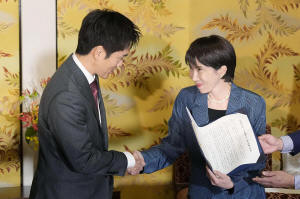Japan's parliament elects Sanae Takaichi as nation's first female prime
minister
[October 21, 2025]
By MARI YAMAGUCHI
TOKYO (AP) — Japan's parliament elected ultraconservative Sanae Takaichi
as the country’s first female prime minister Tuesday, a day after her
struggling party struck a coalition deal with a new partner expected to
pull her governing bloc further to the right.
Takaichi replaces Shigeru Ishiba, ending a three-month political vacuum
and wrangling since the Liberal Democratic Party's disastrous election
loss in July.
Ishiba, who lasted only one year as prime minister, resigned with his
Cabinet earlier in the day, paving the way for his successor.
Takaichi won 237 votes — four more than a majority — compared to 149 won
by Yoshikoko Noda, the head of the largest opposition party, the
Constitutional Democratic Party of Japan. The vote took place in the
lower house, the more powerful of Japan's two chambers of parliament and
the one that chooses the prime minister.
As the results were announced, Takaichi stood up and bowed deeply.
A first, but not a feminist
While Takaichi made history by becoming the first leader of a country
where men still largely hold sway, she has not promoted gender equality
or diversity.
An admirer of former British Prime Minister Margaret Thatcher, Takaichi
is among the Japanese politicians who have stonewalled measures for
women’s advancement. She supports the imperial family’s male-only
succession and opposes same-sex marriage and allowing separate surnames
for married couples.
And despite a pledge to drastically increase the number of women in the
Cabinet, she appointed only two woman ministers — Satsuki Katayama as
finance minister and Kimi Onoda as economic security minister.
“The birth of Japan’s first female prime minister is epoch-making, but (Takaichi)
casts a dark cloud over gender equality and sexual minority rights,”
Soshi Matsuoka, a LGBTQ+ rights activist, said. ”Prime Minister
Takaichi’s views on gender and sexuality are extremely conservative and
could be a serious setback for the rights especially for sexual
minorities.”
However, some felt that her breaking the glass ceiling in politics was
an importer marker of progress in itself.

Takayuki Eguchi, a 62-year-old Tokyo resident, was doubtful that a woman
would even be able to get the votes. He celebrated her achievement by
collecting a free special newspaper edition distributed on Tuesday. He
said her election created hope and expectation given the problems women
have in advancing in Japan.
“I really hope she serves for a long time, and that the political
stagnation we’ve been seeing finally starts to move, and that things
improve in Japan and in the eyes of the world," Eguchi said.
A fragile governing alliance
The LDP's alliance with the Osaka-based right-wing Japan Innovation
Party, or Ishin no Kai, ensured her premiership because the opposition
is not united. Takaichi's untested alliance is still short of a majority
in both houses of parliament and will need to court other opposition
groups to pass any legislation — a risk that could make her government
unstable and short-lived.
The two parties signed a coalition agreement on policies underscoring
Takaichi’s hawkish and nationalistic views.
Their last-minute deal came after the Liberal Democrats lost the party's
longtime partner, the Buddhist-backed Komeito, which has a more dovish
and centrist stance. The breakup threatened a change of power for the
LDP, which has governed Japan almost uninterrupted for decades.
[to top of second column]
|

Japan’s Liberal Democratic Party President Sanae Takaichi, right,
and leader of Japan Innovation Party, or Ishin no Kai, Hirofumi
Yoshimura shake hands after signing an agreement to form a coalition
government in Tokyo, Monday, Oct. 20, 2025. (Kyodo News via AP)

Her challenges
Takaichi is preparing for a major policy speech later this week,
talks with U.S. President Donald Trump and regional summits during
which she also needs to ensure stable ties with China and South
Korea. She needs to quickly tackle rising prices and compile
economy-boosting measures by late December to address public
frustration.
Takaichi was first elected to parliament in 1993 and has served in a
number of senior party and government posts, including as minister
of economic security and internal affairs, but her diplomatic
background is thin.
A protege of assassinated former Prime Minister Shinzo Abe, Takaichi
is expected to emulate his policies, including a stronger military
and economy, as well as revising Japan’s pacifist constitution. With
her potentially weak grip on power, it’s unknown how much Takaichi
will be able to achieve.
Concerns about her nationalism
When Komeito left the governing coalition, it cited the LDP’s lax
response to slush fund scandals that led to their consecutive
election defeats.
The centrist party also raised concern about Takaichi’s revisionist
view of Japan's wartime past. She has taken part in regular prayers
at the Yasukuni Shrine despite protests from Beijing and Seoul,
which see the visits as a sign of lack of remorse for Japanese
aggression. Some of her Takaichi's remarks have also been denounced
has xenophobic.
Takaichi, who is pro-Taiwan, has toned down her hawkish rhetoric. On
Friday, she sent a religious ornament to Yasukuni instead of going
there herself.
China, South Korea and EU react
South Korean President Lee Jae Myung congratulated Takaichi and said
he hopes to hold a summit with her during the Asia-Pacific Economic
Cooperation meetings in South Korea this month. He said South
Korea-Japan relations are more important than ever as global
uncertainty deepens: “I hope to further strengthen our
forward-looking cooperation of coexistence with the prime minister
and between the two countries and the peoples.”
A Chinese Foreign Ministry spokesperson, Guo Jiakun, said that he
hoped Japan would “honor its political commitments on major issues
including on history and Taiwan, maintain the political foundation
of bilateral relations and advance the China-Japan strategic
relations of mutual benefit.” China considers Taiwan, a former
Japanese colony, its own breakaway province to be annexed by force
if necessary.
European Commission President Ursula von der Leyen congratulated
Takaichi and pledged to work with her on behalf of the 27-nation
European Union.
“As Japan’s first female PM, you’re making history," von der Leyen
wrote. "I look forward to working closely together to take the
unique-EU Japan partnership to the next level."
___
AP journalists Mayuko Ono and Reeno Hashimoto contributed to this
report.
All contents © copyright 2025 Associated Press. All rights reserved |